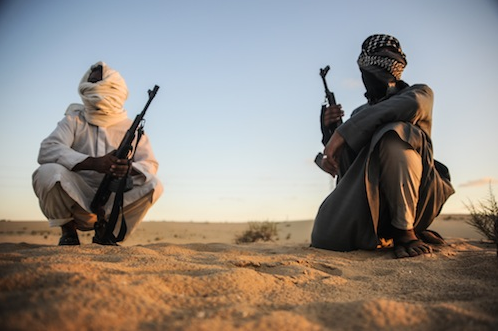 The Egyptian governorate of North Sinai is a volatile region in which and from which violent actors have lashed out at the country’s military and security forces since even before the 2011 fall of Hosni Mubarak. From the summer of 2011, the Egyptian armed forces and police have worked to reestablish stability in the Sinai Peninsula. Given the headache caused by Sinai for successive governments, it is both ironic and an indication of the seriousness of other impending crises that Sinai’s security problem may be the easiest one for Egypt’s next president to address over the short-term.
The Egyptian governorate of North Sinai is a volatile region in which and from which violent actors have lashed out at the country’s military and security forces since even before the 2011 fall of Hosni Mubarak. From the summer of 2011, the Egyptian armed forces and police have worked to reestablish stability in the Sinai Peninsula. Given the headache caused by Sinai for successive governments, it is both ironic and an indication of the seriousness of other impending crises that Sinai’s security problem may be the easiest one for Egypt’s next president to address over the short-term.
The May 26-27 election for Egypt’s next president is all but certain to result in a resounding victory for retired Field Marshal Abdel Fattah al-Sisi, the former defense minister, who ousted the Muslim Brotherhood’s Mohamed Morsi last July.
The Sisi campaign has opted not to issue a policy platform, enabling its candidate to be all things to all people. Sisi’s own statements acknowledge the challenges Egypt faces with its economic, energy, development, and employment sectors; however neither he nor his team has laid out a clear, measurable vision for addressing these problems. Sisi’s slogan may be “Long live Egypt,” but unofficially the message is “I’ll do what has to be done.”
As such, the life-long military man will be elected with a clear mandate to secure stability in Sinai, through any means necessary. Addressing Egypt’s energy crisis and cash crunch will require tough decisions, each of which is sure to ruffle vocal segments of society. As it did last summer, however, Egypt’s population is likely to tolerate – if not vocally support – a continuation of the crackdown Egyptian forces have conducted in North Sinai over the past few months.
Sisi and other Egyptian military leaders have justified the slow pace of stabilizing the peninsula by noting their desire “to avoid civilian casualties.” However, there is little actual reporting out of Sinai and the general population seems to prefer to remain unaware of the situation. Suggestions that perhaps 200 or 280 civilians have been killed in military operations – let alone the number of detained individuals – have only been covered in Brotherhood-sympathetic outlets, and the figures have not been verified. North Sinai is generally a closed military zone to journalists, and Sisi himself told newspaper editors that they should not be “scaring people.”
If “mainland” Egyptians do not care what happens in Sinai, the international community has signaled that it does care: it wants stability, and quickly. The US government, which has a strong relationship with the Egyptian military, regularly laments Egyptian policies it sees as counterproductive to a democratic transition. The US administration, however, praises Egyptian military operations in the Sinai. Even if US officials do privately raise concerns about indiscriminate use of airpower, the decision to release ten Apache helicopters – held since the summer – to the Egyptian military sends the message, “Keep up the good work.”
With Egyptians distracted by their own problems in Cairo and other population centers, and with the United States not discouraging the developments, under the likely presidential victor Sisi, the Sinai Peninsula will face a quick reconstitution of the security state that existed prior to the 2011 uprising.
In the short term, repressive tactics can work to quiet the Sinai and halt Salafi-jihadists from using Sinai to launch attacks west of the Suez Canal. It has been almost four months since Sinai’s Ansar Bayt al-Maqdis has claimed responsibility for a terrorist attack outside the peninsula, following “unprecedented” military raids that begin in late January.
Even if one ignores the human rights and rule of law issues involved, however, such a crackdown is certain to result in blowback in the medium- to long-term. After all, this is what happened during the 2011 uprising: before the revolution provided the opportunity for vengeance, crackdowns in response to the bombings of tourist resorts from 2004-2006 produced five years of relative quiet in Sinai. While capturing violent actors is necessary for stabilizing Sinai, harsh treatment of the broader Sinai population will exacerbate support for such anti-state violence, and that support will simmer below the surface as long as the peninsula’s legitimate political and developmental grievances go unmet.
Sisi recognizes the need for development assistance in Sinai; but he is not the first Egyptian presidential candidate to pledge attention to Sinai’s needs. Given other concerns about Egypt’s economy and stability, neither Egyptians nor the international community pay much attention to Sinai. To them, it is a security problem and they just want Sisi to take care it. In the short-term, he will.
Zack Gold is a Washington-based Middle East analyst and author of the International Centre for Counter-Terrorism – The Hague research paper “Security in the Sinai: Present and Future.” Follow him on Twitter: @ZLGold
Image: Photo: Mosaab El-Shamy
